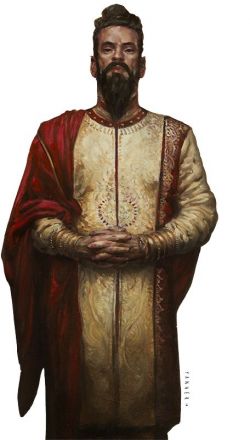Habersi
From OakthorneWiki
Jump to navigationJump to searchNames
- All names are poetic in composition, derived from the celebrational poetry written at the birth of a new child. i.e. Spring Meadow Resplendent in Dew.
- They usually have one or two “use names” derived from the poetic name. i.e. “Spring Meadow,” or “Meadow Resplendent”. They use the Habersi language for these names, however (use Persian, Turkish, and Arabic as inspiration for sounds).
- Names are in no way gendered.
- Family names do not exist. Traders do append the name of their ship when dealing with others of their own Fleet they do not know well, or append the name of their Fleet in dealing with those outside the Fleet. This is done using prefixes to indicate their status aboard the vessel or within the Fleet. So the admiral of the Fleet Vachen would introduce herself as Imira ra'Vachen, while the swabby aboard one of her ships would simply Eldir a'Vachen.
- er - outcast, or the sole survivor of. (Status 1)
- a - deckhand, or common citizen (Status 2)
- zho - officer of a vessel, or a trader (Status 3)
- che - captain of a ship (Status 4)
- ra - admiral of a fleet (Status 5)
- in'Tara - the Master of the Waves, the equivalent of a king among the Habersi Seafolk (though there is an equivalent figure among the Landfolk and the Skyfolk as well).
- Names may alter as elders of fleet or family commission poets to add to the birth poem. Major events such as marriages, gender transitions, great successes or defeats, etc, are considered good cause to add to the birth poem. New elements added to this poem may be added to or used to replace entirely the current name.
Origins
- The Habersi hail from a land they call Bersi, or "the Cradle." Their name simply means "those from the Cradle."
- In that land, they are divided into three cultural/ethnic groups: the People of the Land, the People of the Waves, and the People of the Sky.
- Outsiders do not know much about Habersi society, although it is known that the Skyfolk serve as philosophers and leaders, the Landfolk are largely producers and farmers, and the Seafolk engage in trade. All three castes produce soldiers and defenders, with specializations appropriate to their caste.
- The Skyfolk are the traditional magicians of the Habersi people, although they do teach useful arts to talented members of the other two castes.
- Seafolk Habersi are often called "Traders" by outlanders, and it seems to be a term they are quite happy with.
- Seafolk organize into Fleets of ships that are combination familial vessels under the command of an admiral, advised by the ship captains.
- Fleets are divided into three type of ships: Hands, which reach out and make contact with outlanders, engaging in trade; Heads, which serve to defend and repair the Fleet (the admiral's vessel is always one of these); and Hearts, where children and dependents dwell in safety, protected by Head vessels, while Hands engage in trade and diplomacy.
Appearance
- As a people, the Habersi favor flowing, brightly-colored garb, filled with intricate details such as embroidery and jewelry.
- Culturally, the Habersi look to "the fish, the flower, and the bird" as their thematic and aesthetic inspirations, favoring fluted, layered folds that evoke petals, feathers, and fins, and jewel and floral tones.
Religion
- Habersi revere three Forces that they believe make up the world: the Land, the Sea, and the Sky. These Forces wear many Faces, and each grouping of Habersi have their own names for their patron Force - a Fleet has its own name for the Sea, for example.
Culture
- Poetry is culturally important to the Habersi - they have many modes of poetic expression, including one that is used solely at the birth of a child, which forms the basis for that child's name. Their legal records and other formal "documentation" is rendered in poetic form as well.
- The Habersi (among the Seafolk, at least) do not use a written language; they keep track of records via intricate beads that represent poetic concepts or rhyming schemes, strung on knotted cords, as mnemonic devices that can be "read" to allow recitation of the poem in question even if the one reading it has never encountered the specific verse before. Lovers often exchange bead-strings with one anothers' names on them as a mark of commitment.
- Habersi have marriages of one, three, and five year commitment cycles, although there is no limitation to renewing them once one cycle is completed. These marriages are for two or more adults, all of whom are part of the same ship's crew. Lovers may be taken outside of these commitment cycles, although in practice lovers from within the same crew are usually very short term or are "auditioning" to join a standing commitment; long-term lovers from outside the crew are much more common.
The Starwise Arts
The star-wise of the Habersi are one of the reasons why only they have mastered the seas sufficiently to sail anywhere in the world upon them. The stars guide and protect them as they traverse the waves, and grant luck and joy to the vessel and the People of the Waves.
